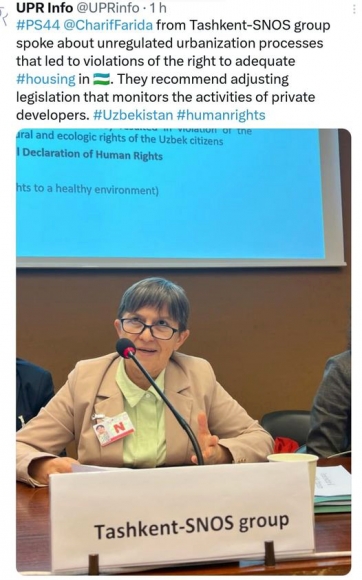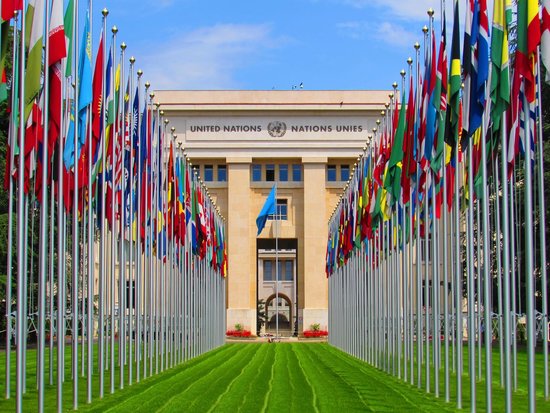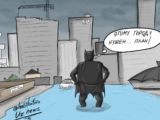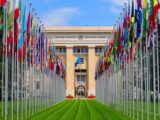UPR pre-session: Human rights issues in Uzbekistan due to Unsustainable Urbanism
20.09.2023The Universal Periodic Review (UPR) is a unique mechanism of the Human Rights Council that calls for each UN Member State to undergo a peer review of its human rights records every 4.5 years. The UPR provides each State the opportunity to regularly:
- Report on the actions it has taken to improve the human rights situations in their countries and to overcome challenges to the enjoyment of human rights; and
- Receive recommendations – informed by multi-stakeholder input and pre-session reports – from UN Member States for continuous improvement.
Established in March 2006 by the UN General Assembly in resolution 60/251, the UPR is designed to prompt, support, and expand the promotion and protection of human rights in every country.
Since the first periodic review in 2008, all 193 UN Member States have been reviewed three times. The fourth cycle of review began in November 2022, at the 41st session of the UPR Working Group.
The Tashkent SNOS group participated in the drafting of two alternative reports, one on forced evictions and the other on land use violations.
On 28 August, a preliminary session was held at the Human Rights Council in Geneva, at which the official delegation of Uzbekistan presented a brief summary of the Report (it has not yet been published). And civil activists from Uzbekistan presented their information on human rights violations in Uzbekistan.
Summary of key issues from previous cycles
The issues of unregulated urbanization processes that have led to violations of the human right to adequate housing were not addressed in the UPR 3rd cycle. This issue appeared and developed since 2017.
On March 4, 2022, the UN Committee on Economic, Social and Cultural Rights (CESCR) regretted the reports about the expropriation of property and forced eviction (tbinternet.ohchr.org/_layouts/15/treatybodyexternal/Download.aspx?symbolno=E%2FC.12%2FUZB%2FCO%2F3&Lang=en). CECSR was concerned about reports on the non-compliance with the national legal framework on property deprivation (art. 11 of the International Covenant on Economic, Social and Cultural Rights – International Covenant on Economic, Social and Cultural Rights | OHCHR) . The Committee recommended, among others, to ensure that evictions are carried out only as a last resort and in accordance with the law and international Covenants on human rights, and to ensure accessibility to affordable legal aid for affected residents (E/C.12/UZB/CO/3, item 43, (tbinternet.ohchr.org/_layouts/15/treatybodyexternal/Download.aspx?symbolno=E%2FC.12%2FUZB%2FCO%2F3&Lang=en). These recommendations were not supported.
National framework
The Uzbek legislation in force during 2018-2023 states for protection of the right to private property: these are provisions of the Uzbek Constitution and Laws: Art. 53 of the Constitution (as in force until April 2022) states: «Private property shall be inviolable and protected by the State. The owner may be deprived of it only in the cases and according to the procedure stipulated by Law». The same provision is enshrined in Art.166, 164, 199 of the Civil Code, and in Art. 32 of the Law on Property, Art. 11 of the Housing Code and in several resolutions of the Uzbek Government. However, exactly these provisions were actively violated by the governmental and judicial bodies of the Uzbekistan.
Challenge 1 – Illegal process of land allocation
1). Right to adequate housing and healthy environment, art.11 CESCR ;
– International Covenant on Economic, Social and Cultural Rights | OHCHR
2) Uzbekistan National report UPR 3rd cycle, 7–18 May 2018 (A/HRC/WG.6/30/UZB/1 – 1802892 (un.org)):
A42 and A47. Public institutions and good governance, §17 proclaims “the principle according to which the people are not at the service of State bodies but that State bodies are at the service of the people”.
B41. The right to development, §35 : “Uzbekistan successfully fulfilled its commitments in respect of the millennium development goals. Water and land resource management has been improved ”
IMPACTS
Citizens’ main grievances are that the decisions of the local authorities to allocate land to private companies result in the seizure and demolition of dwellings and are per se illegal.
These decisions were made without prior consultations with residents nor with appropriated Council of the Municipal Deputies, despite provisions of the Law.
Legislation describes the seizure of land plots only in case of the projects of construction for state and public needs (military, strategic, mining, social infrastructure). However, vast tracts of land in densely populated areas were allocated to private firms for their commercial interests – construction of the commercial multy-sorey houses and shopping-centers. No studies have been carried out on the needs of the city’s social and engineering infrastructure. The new master plans of the cities were not developed. The current master plans of the Uzbek cities are those inherited from the Soviet era, and they are not respected.
The decisions on allocation of the land issued by the local authorities were not registered in the legal database of the Ministry of Justice and are not published, which is the violation of the appropriated Laws’ provisions.
No due diligence check. The vast majority of the firms of developers were established only several months before the decisions on land allocation were issued. Majority of these firms are registered as small and medium-sized businesses with small share capital. And they never had experience nor qualification in the construction works.
Now, we’re seeing the results of lack of due diligence: thousands of people who paid money to those developers, don’t have apartments because of failure of developers.
Absence of the control on the construction works led to the poor quality of the new buildings. According to the State Committee for Industrial Safety, five people died in elevator accidents in 2021-2022, one woman died in the elevator this July. 11 people were injured in a sudden descent of an elevator in one of the Tashkent new built house last June.
Ecologic and energetic issues: One of the reasons for the energy crisis in the winter of 2022-2023 is the construction boom in the absence of city master plans with assessments of additional demands on energy systems. The huge number of new residential buildings creates additional demands at different stages of development.
Tashkent has recently been listed among the cities with the most polluted air in the world. Citizens and the media consistently report that numerous construction projects, tree felling, drainage of water reservoirs, have contributed to increased dust levels in Tashkent.
Often, developers come across layers of groundwater when digging an excavation, and to continue the work, they pump these freshwater reserves into the city sewer system or nearby canals for many months.
The government reacted to growing public anger. According to the Presidential Administration, the Uzbek President Mirziyoyev “criticized the fact that the demand on the existing infrastructure was not accurately calculated when construction permits were issued. A moratorium on new construction will be declared before the approval of the city’s master plan.” However, these declarations were not supported by any document, allowing judges to continue to deny citizens their demands to stop construction projects and overturn demolition decisions.
Challenge 2 – Unfair Trial
Right to fair trial : art.7 and 8 of Universal Declaration of Human Rights (Universal Declaration of Human Rights | United Nations)
IMPACTS
A weighty part of cases considered by administrative courts are complaints against decisions of municipalities related to land plots: 3000 out of 16,256 administrative cases in 2019. In 2020, analogic claims amounted to 3,045 cases (22.7% of all cases considered).
However, judges do not consider the merits of these claims and refuse to satisfy them for two reasons:
- expiry of the time limit taking the court against local administrations decisions – three months (but those decisions were not published!)
- allegedly demolition decisions do not affect the rights of citizens (!!!)
Legal assistance from lawyers is very expensive for most evicted residents, as demolitions and evictions primarily affect low-income families. In addition, few lawyers take on eviction cases, as they are known to be losing, given the judges’ favoring of developers and municipalities.
Therefore, the victims of demolitions often resort to the services of the voluntary representatives, which is permitted by the Uzbek Law. However, in all monitored cases, the courts did not allow voluntary representatives to participate in the process. The courts referred to the fact that the opposing party – namely the developer – opposed such representation. Thus, the courts leave the evictees without protection and only because of the developer’s disagreement.
All courts do not grant residents’ requests for audio and video recordings because the developer’s side is opposed. Thus, the evicted residents are left without evidence that the courts consider cases unilaterally, making decisions in favor of the developers. Residents cannot then file complaints about the behavior of judges with the Supreme Judicial Council
Application of irrelevant provisions of the Law (!!!)
The current Law does not provide for the forced seizure of private property and forced eviction of the owner at the request of a private commercial company. So, the judges, under the guise of “analogy of law”, equate private house with municipal property, and the commercial interests of private companies with public needs of the State. The judges refer to the law regulating demolition for public needs, while most demolitions and evictions are carried out only for profit of the private companies in the real estate and commercial sector. According to Uzbek law, the exhaustive list of public needs does not cover private commercial real estate.
Challenge 3 – Forced eviction
Arbitrary interference with privacy (article 12, Universal Declaration of Human Rights | United Nations)
Forced eviction shall be considered as torture according to the UDHR, art.5 !!!
IMPACTS
Since the procedure for forced eviction is not described by the Law, nothing limits it. You can be evicted in any weather, at any time, even at night. It is possible to evict pregnant women, the sick people, people in a heat of passion. Eviction can occur even if a person has not exhausted all judicial remedies for their protection.
The eviction procedure itself is very cruel: it provides for a large accumulation of representatives of law enforcement agencies, breaking down gates or doors, breaking out windows, taking out all the things of the owners, even in their absence.
This happened with a woman from Tashkent, M.M., who was evicted at the moment when her case was under consideration by the Supreme Court. She was evicted mid-March 2021, and 10 days after eviction, she died
Challenge 4 – Labor safety violations
Right to work : Article 6, 7 CESCR International Covenant on Economic, Social and Cultural Rights | OHCHR
Uzbekistan National report UPR 3rd cycle, 7–18 May 2018, Е 31. Right to work(A/HRC/WG.6/30/UZB/1 – 1802892 (un.org)
IMPACTS
Since civil engineering in Uzbekistan is not considered as a sector for which a qualification license is required, some people can open a construction firm, easily obtain a plot of land, easily evict residents from their homes and begin construction without qualified personnel, no safety training, and no supervision at all. According to a Presidential Decree of October 30, 2020, construction companies are allowed to hire workers without a contract and to pay wages in cash. According to the Uzbek State Tax Committee, in 2019-2022, about 50% of all construction companies showed in tax declarations only one employee, so, it looks like tax evasion.
Lack of construction control and safety leads to accidents and deaths of workers. According to the Ministry of Employment and Labor Relations, between 2017 and 2020, 302 construction accidents occurred, resulting in 119 deaths and 117 serious injuries. Often these workers or their families do not receive compensation unless the company has taken out insurance.
Recommendations
- Eliminate all inconsistencies and ambiguities in the legislation regarding the allocation and withdrawal of land plots; and do not resort to “an analogy of law.”
- Establish an independent commission to investigate claims of illegal land confiscations and provide remedy for those who were evicted through using of irrelevant law.
- Adopt legislative measures strictly defining the circumstances and safeguards related to eviction, and to stop all forced evictions until such measures are in place”.
Post-scriptum
The National Report from Uzbekistan has not yet been published. Nevertheless, at this preliminary session, a delegation from Uzbekistan, I believe, the staff of the Permanent Mission of Uzbekistan to the United Nations, spoke. According to the Uzbek speaker, everything is fine with us! 90% (or more) of the provisions of international conventions are implemented in our legislation!
“What’s the use?” – I said. Our written Law is just fine: the Housing Code, the Constitution, the Land Code, the laws on private property – all protect the rights of the owner. On paper. However, in real life, both state bodies, local authorities, and – most importantly – judicial bodies simply trample these laws into dust.

It was very difficult to fit into the 5 minutes allocated for the report on demolitions, the topic is vast. There are violations of the right to housing, the right to access to a fair trial, the right to privacy and home, the right to information and participation in public life, the right to a healthy ecological environment, the right to cultural heritage, and the right to labour….
I would like that Uzbekistan receive the following question : why in the country with so smart written Law the people suffers from its permanent violation?
Farida SHARIFULLINA, administrator of the group “Tashkent –SNOS” on Facebook
Source: Как в Узбекистане нарушаются права собственников, – группа Ташкент-СНОС (asiaterra.info)


